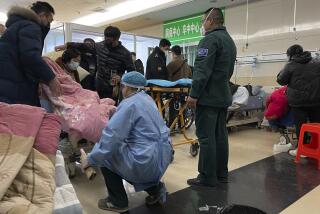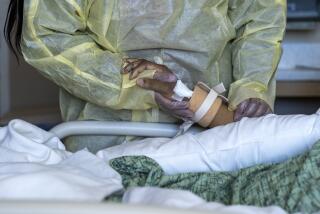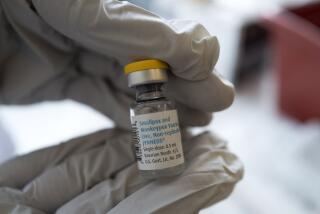In Spain, coronavirus deaths mount as nation continues to hunker down
BRUSSELS — In normal times, Sagrario Perez would have sent her father to the grave with an elaborate mourning process: hours praying over the body, a respectful Mass, a burial attended by hundreds of friends and neighbors.
But these are not normal times.
While Perez’s father Efigenio, 76, was in a hospital near Madrid earlier this week, Spain was placed on lockdown in an effort to curb the spread of the coronavirus. Residents were prohibited from leaving their homes except in cases of necessity, and all gatherings were banned.
So when Efigenio died of complications from Alzheimer’s disease, all the trappings of a proper Catholic funeral were lost — a final insult to the memory of a deeply religious man. At his burial, his children stood far from one another, careful not to touch. Afterward, they returned to their homes, where they grieved alone.
“We can’t console one another,” Perez said in a phone call from Torrijos. “You need a hug from someone, from your sibling, from your child. But it couldn’t be.”
By midday Saturday, Spain had logged nearly 25,000 infections and 1,326 fatalities — the most for a European country besides Italy, where the death toll rose by 793 on Saturday alone and now approaches 5,000.
Hospitals in Madrid, Spain’s hardest-hit city, are running out of beds and crucial medical supplies such as respirators. Officials, scrambling to avoid an Italy-scale crisis, have called in medical students and retired doctors to help care for coronavirus patients.
COVID-19 has forced Spaniards to adapt to a drastically new social reality. No more cañas after work, no more Sunday lunches with the family. Soccer games are canceled, as are the country’s famed Semana Santa processions.
They also can’t attend funerals en masse, or weddings. Churches, a source of spiritual respite for much of the elderly population, have closed their doors.
Luis Martínez, 29, a cardiologist at La Paz Hospital in Madrid who has been working exclusively with COVID-19 patients for the last week, said he worried that the hospital’s intensive care units would soon be full. At last count, there were 600 coronavirus patients in the hospital — 80% of all patients, he estimated.
“The sensation is a bit unreal,” he said. “It’s changed from something that two weeks ago only affected a few patients, something that that we saw as far away, to becoming something that is totally overwhelming.”
Madrid hospitals have begun repurposing empty hotels for patients who are less sick, Martínez said — but recuperation is a long process, meaning few survivors have left the intensive care unit since they were admitted.
“We are nearing being completely full,” Martínez said.
As the crisis deepens, doctors who do not specialize in urgent care await what they see as an inevitable call.
Adrian Valls, 29, a neurologist at the San Carlos Clinic in Madrid, said his hospital has begun transforming spaces not normally equipped for treatment into rooms for patients. Beds have been brought into the waiting rooms and offices, he wrote in a text message. He was starting to feel nervous.
“It’s imminent that they’ll call me,” he wrote. “It’s just a question of time.”
In Torrijos, the town of 13,000 where Perez lives, people are used to meeting at restaurants and spending weekends outside their homes.
‘“It’s very difficult. In Spain, we’re warm people,” Perez said. “We go out a lot. Life is lived on the street.”
And while she received hundreds of messages of condolence — a testament to the town’s love for her father — Perez thought he would have been disappointed.
“He would have thought it lacked something,” she said.
In Calendario, a town east of Madrid, the coronavirus is revealing ruptures in the town’s social fabric.
On March 9, an ambulance brought Andrés Elena Domínguez to the hospital with a serious respiratory illness. A test for COVID-19 produced a negative result.
But while he was in the hospital — an hour north of Calendario — Domínguez’s pneumonia worsened. On March 11, doctors performed a second test. It came back positive.
Three days later, Domínguez died.
As his children mourned his death, they also met with fear and anger from some townspeople who accused their father of bringing coronavirus to Calendario — even though he caught the virus in another city. One day, Domínguez’s son Andrés Elena García, who drove in from out of town, found his tires slashed.
In response, García published an essay on a local news site pleading to the townspeople for understanding.
“We are not accusing anyone but we ask, knowing that the emergency situation we are living is not the best moment, that they stop stigmatizing us, because the infection was produced in the chain of transfer and treatment, not in Calendario.”
The essay was shared in the town’s Facebook group, where the family received dozens of apologies from locals.
Marta Ripoll, a Catalan doctor based in northern Italy, has tried to warn her fellow Spaniards of the dangers of COVID-19.
On Monday, she posted a widely shared video on Facebook, her face somber as she read aloud the local statistics from Italy at the time: 5,000 admitted to hospitals, 600 in intensive care, 1,200 dead.
“It’s a lot,” Ripoll said, grimacing — and those statistics were just for Lombardy, the region where she worked.
Then she coughed.
Ripoll had caught the coronavirus while working in the hospital.
“There were many sick people in little time,” she warned about her experience in Italy. “A collapse in the health system.”
“Please. Stay at home. I don’t want the same to happen” in Spain.
But her message may have come too late.
More to Read
Sign up for Essential California
The most important California stories and recommendations in your inbox every morning.
You may occasionally receive promotional content from the Los Angeles Times.










